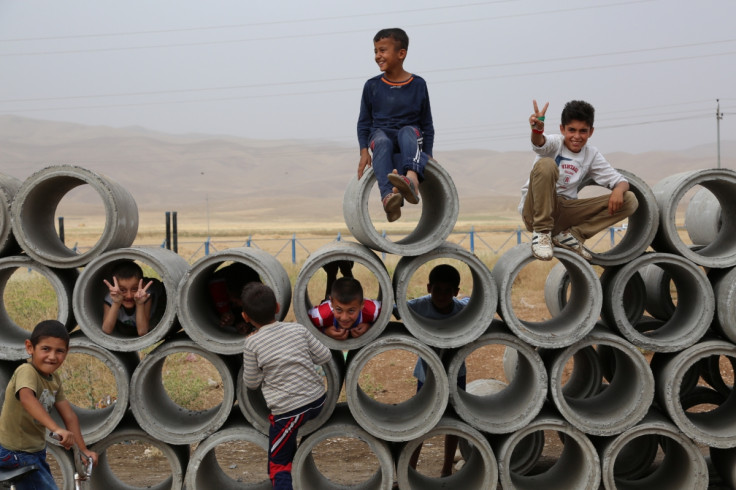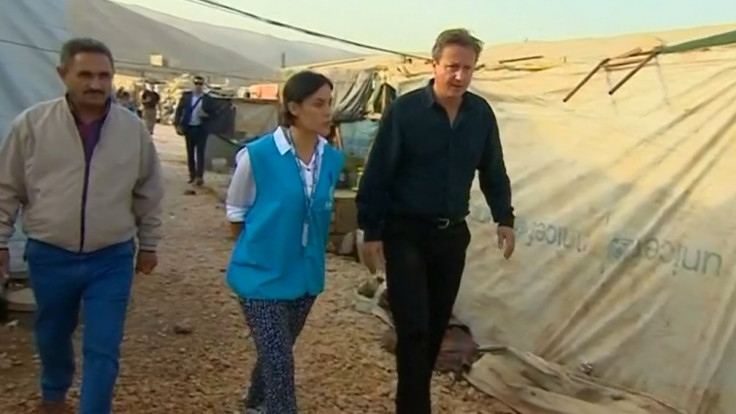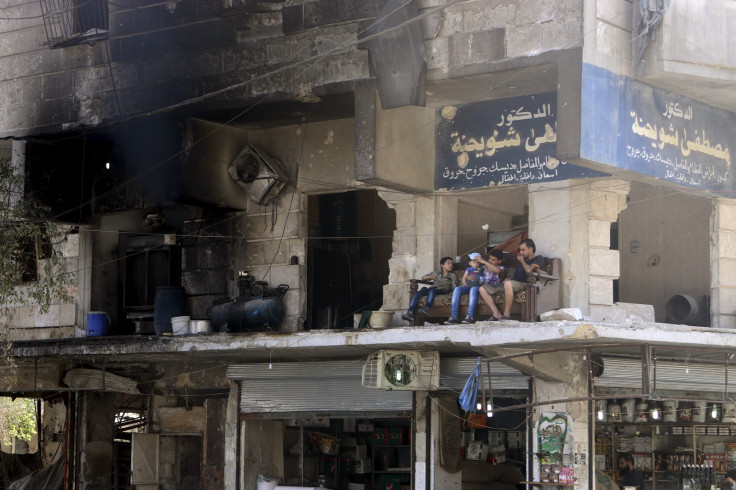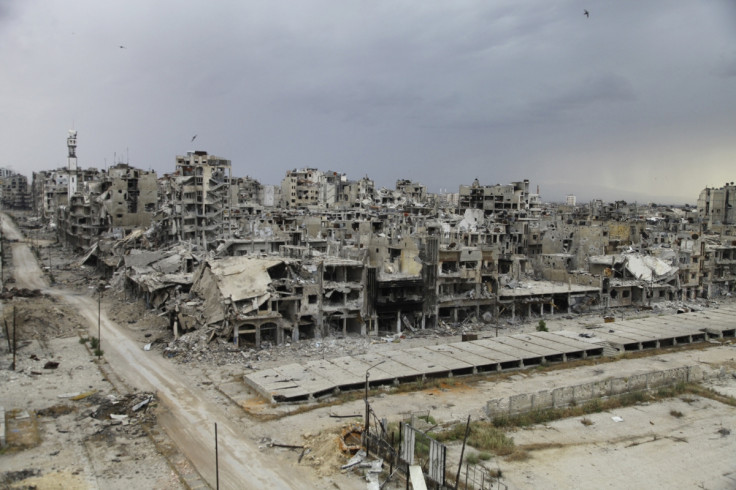Syrian refugee crisis: 20,000 journeys to the UK

The first of the 20,000 Syrian refugees the British prime minister David Cameron has promised to resettle over the coming five years are thought to have arrived in the UK.
They flee a devastating war in Syria, which erupted amid the 2011 Arab Spring and has seen the slaughter by Syrian government forces and Islamist militants of at least 220,000 people, according to the United Nations. Homes have been destroyed and lives extinguished but the fighting shows no sign of ending any time soon.
Though hundreds of thousands of desperate migrants and refugees are already in Europe, many having made treacherous journeys across the sea in overpacked boats or by land in the back of suffocating lorries, none of them will be taken in by Britain.
Instead, Cameron said the UK will take refugees directly from the camps around Syria, such as in Lebanon and Iraq, where aid agencies are working around the clock to keep people fed, watered, clothed and sheltered. This is to deter others from making the dangerous and often fatal journey to Europe, though few expect the tactic to work because the push factors of war and poverty are so strong.
As the first of the 20,000 Syrians find safety in the UK, here is how the process works, from the camps of the Middle East to the streets of Britain.
Refugees' fate lies in the hands of UNHCR officials
The most vulnerable Syrian refugees in the Lebanese and Iraqi camps will be identified by those working for the UNHCR, the refugee agency. These vulnerable people, in particular orphans, will be prioritised by the British for resettlement and fast-tracked through the asylum system.
The UNHCR criteria is stringent. Among those deemed vulnerable enough to qualify for the resettlement scheme are "women and girls at risk, survivors of violence or torture, refugees with medical needs or disabilities, refugees at risk due to their sexual orientation or gender identity, vulnerable older refugees, and refugees in need of family reunification", according to a UNHCR document. It uses "registration data and community outreach" in the refugee camps to establish who is vulnerable and therefore qualifies for its emergency resettlement shortlist.
Not all those selected by the UNHCR will end up in Britain, because the UK government still has the final say on who it lets in. And, while the Refugee Council has called on the government to frontload its intake of refugees because of the urgency of the current crisis, ministers have given no clearer timeframe than by 2020 for the 20,000 people.

In the refugee camps, the situation is increasingly desperate. Caroline Anning of Save the Children has just returned from the camps in Lebanon, which are poorly constructed ramshackle settlements without suitable plumbing or power.
She told IBTimes UK that Lebanon is running out of essential resources, such as food, and more funding is urgently needed. Work is drying up for Syrian refugees because of a Lebanese government crackdown on permits. Some children are forced into labour just to help their families survive. And while there is some optimism that European countries such as the UK are letting more refugees in, realism dominates.
"The conditions in Lebanon are incredibly difficult and getting worse all of the time," Anning said. "Services are totally overwhelmed. The whole country is totally overwhelmed. People have it in their minds that they'd love to be able to go [to Europe] and some people had heard about the UK's new announcement of 20,000. People were pleased [...] but they were also aware that it's a drop in the ocean."
The UNHCR is planning to put forward 9,000 names for people to be resettled from Lebanon in total by the end of 2015, Anning added, which is just 0.75% of the refugee population there. She said: "Most people are aware that that's not going to affect them."
If they are lucky, they will be picked up by the UK government
Once picked up by the UK government, the refugees will be entered on to the Vulnerable Persons Relocation Scheme (VPRS). So far, only 216 Syrians have made it into the UK via this fast track scheme. An additional 5,000 have found refuge here through the traditional asylum system, which more Syrians may yet come through if they can make it to the UK to apply.
Those few who make it on to the VPRS will, once vetted and their specific needs established, be transported from the camps to Britain, where the will be helped to start a new life. They will be met at the airport and taken to where accommodation has been prepared. A package of support for each individual's needs will also have been prepared in advance.
The Home Office is cagey about the scheme and would not confirm more specific details of the resettlement process to IBTimes UK once the refugees arrive, such as their destinations. But some councils are open about agreeing to take refugees under their authority, including Bradford, Plymouth, Birmingham and Newcastle.

For the first year they are given state-funded support to integrate
Signing up with a GP, school places, accommodation, English language lessons, welfare, work, foster care – the refugees will be supported with all of the essential components of an ordinary life in Britain, relative to their needs.
For the first year at least, that money will come from the Department for International Development's £12bn budget, to ease the financial pressure on local councils. There will also be support on hand from local refugee groups and NGOs – from help filling out forms, to translation services.
But the funding beyond that remains in doubt
Chancellor George Osborne has not committed Treasury funding to beyond one year. He is still undertaking his spending review across all government departments. It is thought that there is a behind the scenes battle going on between central and local government over who will pay for the services refugees need after the first year.
The Local Government Association (LGA) expressed concern when Cameron announced the 20,000 figure. "The LGA has been in discussions with government over a number of years on such issues and is committed to urgently working together to find new solutions," said Councillor David Simmonds, chairman of the LGA's Asylum, Migration and Refugee Task Group.
"Any support offered by councils must be on a voluntary basis where support can be adequately provided. However, central government has to recognise that any costs associated with this international problem must be fully met by Whitehall."

And they only have five years before their lives are up in the air again
Each of the refugees resettled in the UK is given five years' humanitarian protection status, which means they can work and access public money. But when that time is up, they will have to apply through the formal asylum channels for permanent leave to remain. And there is no absolute guarantee they will be given it.
While most of the Home Office grounds for refusing applications to stay are centred on reasons of criminality of national security concerns, one of the grounds is: "The applicant has not maintained and accommodated themselves, and any dependents, without need to use public funds."
They are unlikely, unless they have committed criminal acts in the UK, to be refused permission to stay. Especially if Syria is still torn by war. But the fact is that they do not automatically have the right to stay after five years, so still have a small cloud of uncertainty hanging over their heads while they live in the UK.
Many more will be left behind
As Anning from Save the Children pointed out, the Syrian refugees being taken in by the UK are a tiny fraction of those who have fled the country. There are around nine million Syrian refugees in total, says the UN, a number that is rising. Two million of those are in Lebanon.
The British government has given £1bn in foreign aid to help refugees in the area since 2012, including food rations, healthcare supplies and education materials, for example. It is one of the largest contributors.
But the situation will only get worse until the root cause of the Syrian refugees crisis – the war between the tyrannical president Bashar al-Assad, who is barrel bombing his own people, and the theo-fascist terror group Islamic State (Isis) – is sorted out once and for all. And that may be many years off.
Note: The first sentence of this article has been amended after publishing to reflect the uncertainty around the exact timing of the arrival of the first batch of the 20,000 extra Syrian refugees the UK government is promising to shelter by 2020.
© Copyright IBTimes 2025. All rights reserved.






















